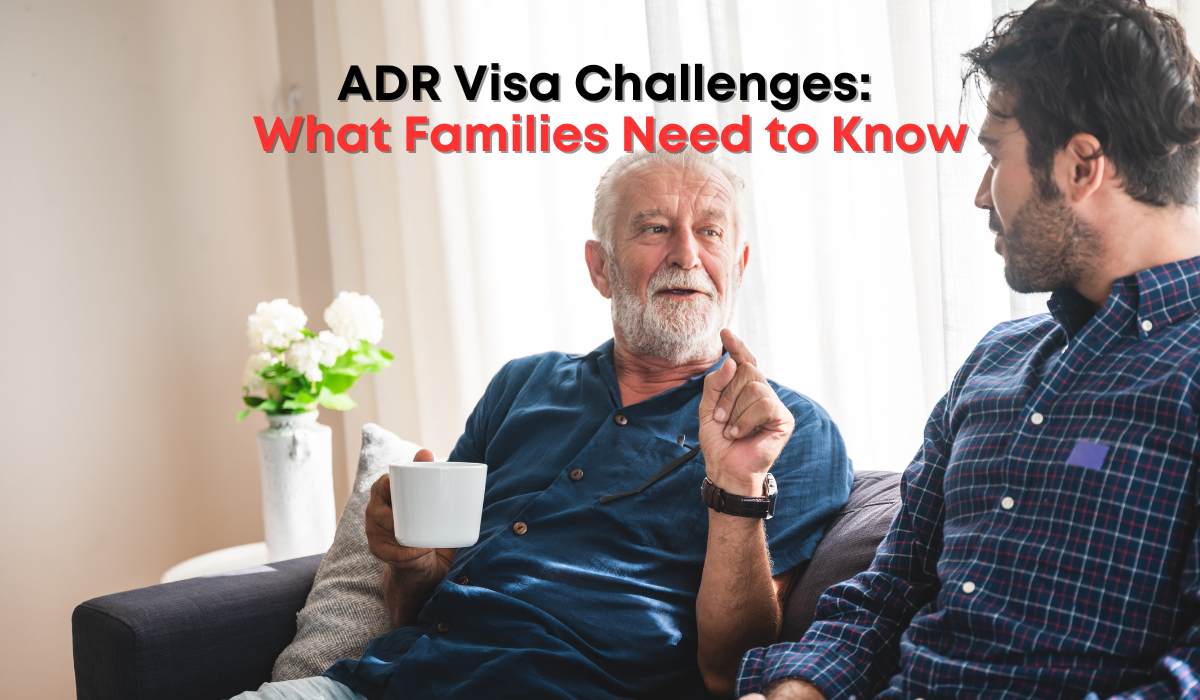Bringing a loved one to the UK under the Adult Dependant Relative (ADR) Visa is often fraught with emotional and practical complexities. Designed to help British citizens and settled persons care for their elderly, unwell, or disabled relatives, this visa route offers a potential lifeline. However, navigating the Immigration Rules—particularly those concerning a relative’s partner—requires careful preparation and legal insight.
This article examines the key partner requirements in ADR Visa applications, providing practical guidance through hypothetical family scenarios.
Overview of the Adult Dependant Relative Visa
The ADR Visa allows a qualifying relative to join their sponsor in the UK, provided they meet stringent requirements, including:
- The sponsor is British, settled, holds Appendix EU leave, or has refugee/humanitarian protection status.
- The applicant (parent, grandparent, sibling, or adult child) requires long-term personal care due to age, illness, or disability.
- Adequate care is unavailable or unaffordable in their home country, even with the sponsor’s financial assistance.
- The applicant will be maintained and accommodated in the UK without recourse to public funds.
For detailed criteria, consult the relevant section of the Immigration Rules.
The Partner Requirement: What the Rules Say
Appendix ADR states that if the applicant is a parent or grandparent, they must not be in a subsisting relationship with a partner unless the partner applies for entry clearance at the same time. This requirement is outlined in ADR 5.3A.1.
The following scenarios illustrate how this rule operates in practice.
Scenario 1: One Grandparent Requires Care, the Other Does Not
Imagine a sponsor’s grandmother requires significant daily care, but her husband is in good health. Appendix ADR specifies that only one grandparent needs to satisfy the long-term care requirement.
However, under ADR 5.2, the Home Office will examine whether the healthier partner could reasonably provide the necessary care. If the healthy grandparent is deemed capable of caregiving, the application may fail.
Key Takeaway: Proving that care needs cannot be met by the healthy partner is critical. Evidence of the healthy partner’s limitations (e.g., their own age-related frailties) will strengthen the application.
Scenario 2: One Parent Applies, the Other Does Not
Suppose a sponsor’s disabled mother wishes to join her child in the UK, but her husband prefers to remain in their home country. Unfortunately, Appendix ADR bars such an application. Both parents must apply for the ADR Visa simultaneously if they are in a subsisting relationship.
Key Takeaway: Families in this situation may need to reconsider their options or explore alternative visa routes, as the ADR Visa mandates both partners apply together.
Scenario 3: Parents Are Separated but Still Legally Married
In a case where the sponsor’s parents are legally married but functionally separated, only the parent with care needs may apply for the ADR Visa. This hinges on proving that the relationship is no longer subsisting.
The concept of a subsisting relationship is not explicitly defined in Appendix ADR but is interpreted through broader Immigration Rules. Shared finances, cohabitation, or mutual responsibilities could indicate a continuing relationship, while separate lives suggest otherwise.
Key Takeaway: Applicants must provide robust evidence to demonstrate the absence of a subsisting relationship, such as proof of separate residences and financial independence.
Scenario 4: Grandfather’s Spouse Is Not Related to the Sponsor
If a sponsor’s grandfather has remarried and his spouse is not related to the sponsor, the ADR application will fail. The Home Office explicitly states that both partners must be direct relatives of the sponsor to qualify under Appendix ADR.
Key Takeaway: This scenario highlights the importance of carefully assessing familial relationships before applying, as unrelated partners are ineligible under this visa route.
Dependency Requirements: ADR 5.1 vs ADR 5.2
While only one partner must have care needs under ADR 5.1, meeting the ADR 5.2 dependency requirement can be challenging if the healthier partner is expected to provide care. The Home Office often assumes that a healthy partner in the home country can assist with daily tasks, thereby negating the need for UK-based care.
Evidence to Include:
- Medical reports outlining care needs.
- Proof of unavailability or unaffordability of care in the home country.
- Statements from healthcare providers or carers confirming the lack of suitable care.
Addressing the Unique Challenges of ADR Applications
Tolstoy famously wrote, “All happy families are alike; each unhappy family is unhappy in its own way.” This sentiment rings true for families navigating the ADR Visa process. The intertwining of legal, emotional, and logistical considerations makes each case unique.
Practical Steps for Applicants:
- Seek Specialist Advice: Consult an immigration solicitor to assess eligibility and devise a tailored strategy.
- Gather Comprehensive Evidence: Ensure all medical, financial, and personal documents are thorough and up to date.
- Consider Alternatives: If the ADR route is unviable, explore other options such as long-term visit visas or human rights applications under Article 8 of the ECHR.
Final Takes
Understanding the nuances of the partner requirement in ADR Visa applications is critical for success. Each case is unique, and even minor differences in family dynamics can significantly impact the outcome. By seeking expert legal advice and preparing a well-documented application, families can increase their chances of reuniting with their loved ones in the UK.
If you are considering an ADR Visa, our team of experienced immigration solicitors is here to help. Contact us for a consultation and take the first step toward reuniting your family.
Get in touch: For a comprehensive understanding of your options or queries on UK immigration matters, contact GigaLegal Solicitors at 02074067654 or click here to book a no-obligation consultation with an immigration expert.


